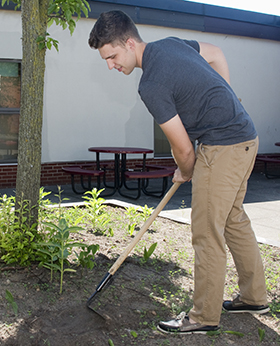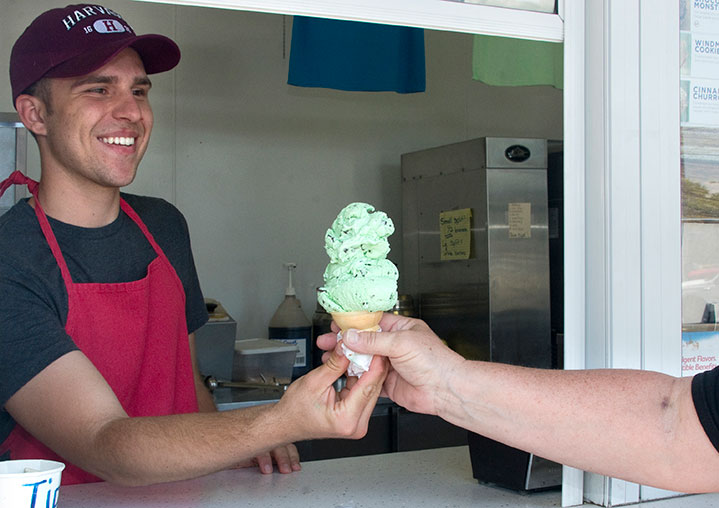It’s not so much that Wyoming High School graduate Mirnes Kukic is bound for Harvard University as it is the personal qualities that surface as you chat to discover that he loves to fish, counts his grandfather as mentor, made his first coin unloading trailers of produce at 11, and prefers not to share his SAT score.
A second-generation Bosnian, Mirnes was one of nearly 40,000 high school students who applied to Harvard for the 2017-18 school year, an institution founded in 1636, 140 years before the signing of the Declaration of Independence.
To say it’s tough to be admitted is an understatement. The Massachusetts Ivy League school gave the green light for the incoming Class of 2021 to just over 2,000 applicants, for an acceptance rate of 5.2 percent. Among the largest colleges nationwide, only Stanford University accepted a lower rate, at 5.0 percent.
But in bringing his typical “Mirnes-ness” to the table, he’ll direct the conversation away from beating the odds to attend the nation’s oldest institution of higher learning, in favor of everyday loves and his personal credo for living.
“I feel as though if I had the world’s attention for about 20 seconds, I would tell people that if you don’t like something, then change it,” he says. “A lot of people like to complain about things – their challenges and sorrows – when in fact the paths to change might be clear. The path is there. That goes for politics, your health and more. But sometimes, I think we forget how much we can control.”
One of the keys, he offers, is that “You have to surround yourself with good people, the sort you want to become yourself.”

‘Harvard is a Big Deal’
And indeed, Mirnes does surround himself in that manner, whether he’s leading a volunteer effort to clean up a school courtyard, serving aces as the No. 1 singles player on the varsity tennis team, or serving as drum major or trumpeter in the school’s wind and jazz ensembles.
Principal Nate Robrahn is all smiles in describing what is believed to be the first-ever member of Wyoming High – or its predecessors, Wyoming Park and Wyoming Rogers – to be accepted to Harvard.
“We’re pretty sure he’s the first. We’ve had some kids who have gone to West Point, and some pretty outstanding kids in general, but Harvard is a big deal.
“He’s top shelf,” adds Robrahn, now in his fourth year at the helm, describing how Mirnes is “one of the reasons we choose to be educators.”
“He always finishes his work, and it’s done at such a high level, but even beyond that, he’s got such a heart for other kids at this school. He really cares, and wants to make a difference.”

A Solid Foundation
Mirnes was born to parents who emigrated here from Bosnia, and he leans on lessons learned both from his mother, Jasmina, and his paternal grandfather, Mustafa Delali, to motivate him.
It’s aboard a boat while fishing with the latter mentor that Mirnes says he learned not only how to reel ’em in, but “how to be a gentleman, to be a good person, to do the right things.”
“He always told me that you try to make a place better than when you got there,” says Mirnes, “and that’s something you don’t always think of as a kid. But that’s a valuable lesson, to take care of other people’s spaces, and to be a good listener.”
Mirnes earned his first dollar at 11 or so, unloading trailers of vegetables at a farmers’ market in Holland for an uncle. He’s also worked a spell at the Burlingame Dairy Dip.
Back at his home, Mirnes has a picture of Einstein in his bedroom; it’s been there “since I was a tiny kid.”
It’s there not to intimate that he’s smarter than anyone else. In fact, he insists, “I’m not any more intelligent than anyone else – I’m just curious. We’re all smart in our own ways, but I think that the people who end up discovering the most in the world are the most curious. I think that’s what breeds intelligence.”
He’s not shy about cheerleading his high school, and for all the right reasons:
“I know a lot of kids who go (elsewhere) but I think the extra thing we have to offer at Wyoming is diversity, and an especially great staff. It’s something you can’t get everywhere else. When I was in Boston (recently), there were a lot of other (incoming students) who don’t come from diverse schools. But every day, I’m exposed to different colors, races, ethnicities. For me, that’s normal. That’s how the real world is.”
Mirnes understands what a privilege it is to live and study here — especially against the backdrop of how his parents were forced to flee war-torn Bosnia during the 1990s.
“They went hungry a lot,” he says of his parents and other members of his extended family who escaped. “My dad said he ate carrots every day for a straight month, because that’s all they had.”

Power to Change
When Mirnes isn’t studying or playing sports or music – he flirted with the idea of majoring in music – he loves to volunteer through the school’s Key Club and the National Honor Society, in everything from blood drives to cleanup projects to Special Olympics to Habitat for Humanity.
Without being asked or even telling anyone ahead of time, Mirnes directed an effort to restore the school’s courtyard, which had become overgrown with weeds. “Let’s turn that into usable space,” he remembers telling himself, “where you could have a class out there, or eat lunch.”
Mirnes isn’t sure about a career path, except that he’d “love to do something in government.” He explains, “There’s a lot of different ways to help people and make an impact on community, and one way to support an entire community of people is by making their lives better and passing legislation that they want.
“At the end of the day, I feel like being a politician should be one of those roles where you serve the most, where you should be completely vulnerable to the people you’re serving.”
Are you listening over in Lansing … in D.C.?
Four years from now, you may be running against this young man.
I’d start planning now.










